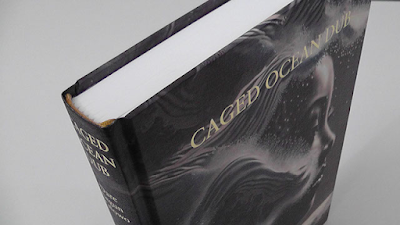Our humanity both unites us and divides us. The question is always one of balance. In this debut collection by a rising star of Nigerian fiction, stories range in genre from social realism (sort of) to science fiction by way of weird tales. These stories are sometimes bloody, often magical, and rise to remarkable heights of stylistic power. I learned a lot and was often puzzled - both good reactions to a new author, I find. So, what is going on?
The book is divided into three sections - 'Hungers', 'Ghosts', and 'Heralds'. Among the first group of stories is 'Oases'. a terrible, intense account of a refugee family trekking across the Sahel, bringing home the perma-crisis that besets so much of our world. 'Eating Keolin' is a horror/fantasy about a pregnant woman whose world is disrupted by colonial forces that are countered by Amazonian women and leopards.
'October in Eran Riro', a novella, tells of an internal migrant - that most Victorian of characters - but in a distinctly Nigerian way. October is a girl whose family falls from middle class prosperity to penury overnight, and who - after both parents are dead - finds her way to the eponymous restaurant. Strange people and strange rituals are described in detail, which is both hallucinatory and oddly matter-of-fact. Magical realism, of a kind.
Among the Ghosts is 'Ngozi Ugegbe Nwa', in which a beautiful model purchases a magic mirror from a roadside hawker. A conventional theme, certainly, but again Falowo takes their reader in new and strange directions. 'Vain Knife' is also a highly effective tale of horror, in which the Devil prompts a put-upon son to stab his tyrannical mother. Things do not go as planned, to say the least.
The last section, 'Heralds', consists of science fiction stories. These reminded me a little of the New Wave science fiction of the late Sixties/early Seventies. That was an explicit reaction against the tropes and 'realistic' prose conventions of Golden Age sf - the works of Clarke, Asimov, Heinlein etc. I don't know if Falowo is reacting against something similar in Nigerian fictional traditions, but I wouldn't be surprised. The result is startling, demanding, and never less than interesting.
'Biscuit and Milk', a tale of interstellar travel, is exuberantly inventive, offering a future struggling with ecological collapse but also worth living in - quite an achievement. The short and powerful 'What Not to Do When Spelunking in Anambra' is a clever, surreal variant on the idea of alien influences discovered here on earth.
Caged Ocean Dub is a remarkable debut. Falowo's style is poetic, dazzling, and perhaps a little heady for readers used to firm restraint and the (very artificial) conventions of realism. There is power here, and strangeness, and a sense of cultural tectonic plates shifting. None of which are bad things.






No comments:
Post a Comment